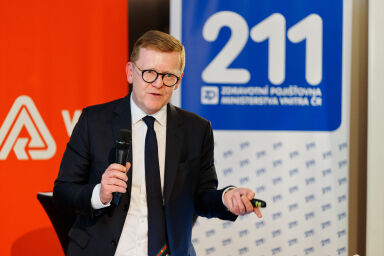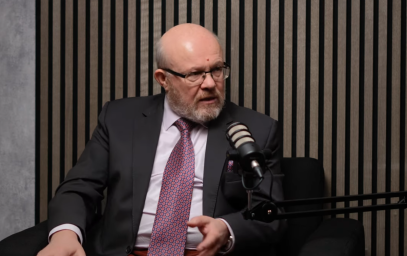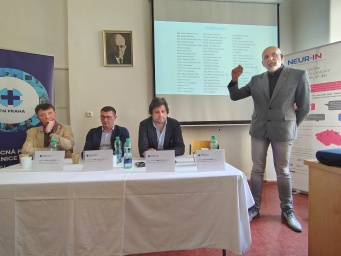The professionalization of the army has not diminished the impact of the health of the population on the country’s defences. Rather, even given demographic trends, it has strengthened – due to the need for the military to recruit top-notch soldiers and personnel. Prevention and mental health promotion should therefore be a priority for policymakers. In a Eurodebate jointly organised by the editors of Zdravotnický deník, Ekonomický deník and Česká justice, Jaroslav Bžoch, deputy chairman of the parliamentary foreign and European affairs committee and ANO candidate for the European Parliament, agreed with experts from the defence ministry and other fields.
Jaroslav Bžoch, a candidate for MEP, assured the other speakers in Eurodebate that he is not worried about the health of the current Czech soldiers. „The Czech Republic has a professional army today and I am convinced that great emphasis is placed on the health of active soldiers,“ he said. He also added that the health of the population has an impact on how the recruitment of new soldiers to our army will look like in the coming years. „We would already need more professional soldiers today, and it is questionable how many of the new applicants will meet the medical fitness or physical fitness requirements,“ Bžoch expressed mild concern.

Prevention is therefore important for the country’s defences, but not only for the country. „Prevention is essential in all aspects. For us to prosper as a country, we need to have a healthy population – even those of pre-retirement and retirement age. Prevention is not only important for our military, but we also need to have healthy police officers, firefighters and other forces that keep us safe. It is therefore true that prevention should be our number one priority,“ Bžoch says.
The health of the population plays a key role in the defence sector in the medium and long term, believes CSG Aerospace Vice President Brigadier General Bohuslav Přikryl. „The military’s ability to defend its country is closely linked to the health of the population. An unhealthy population is not only more susceptible to diseases, but it especially negatively affects the recruitment potential and availability of military personnel and, consequently, the operational readiness of units, which can weaken the army and make the country more vulnerable to external threats,“ believes Přikryl, who added that the importance of the health of the population for the Ministry of Defence is determined by the legal conscription obligation, which applies to all citizens of the Czech Republic between the ages of 18 and 60.

According to the Brigadier General, the health of the soldiers is also crucial because in current and future conflicts, the human being will always be of paramount importance. „Stress, fatigue, potential injury and discomfort are factors that significantly affect a soldier’s long-term ability to perform required activities. The shelf life of an unprepared, unhealthy and unfit soldier will be significantly shorter. A Soldier who is neither physically nor mentally prepared becomes exhausted more quickly, which shortens his or her effective time in the field. As fatigue increases, reaction speed, the ability to perform fine motor movements and maintain attention, which are key skills for operating modern and sophisticated weapon systems, decrease,“ described Přikryl. He added that mental resilience is also a very important aspect for soldiers. „High levels of stress and psychological strain can lead to psychological problems such as anxiety and depression, which can fundamentally affect a unit’s combat capability. Therefore, it is necessary to pay increased attention not only to the physical but also to the psychological health of the population,“ he stressed.
Therefore, health prevention and programs to improve physical fitness and mental resilience are also essential to maintain a high level of readiness of the population to defend the country, according to Prikryl. „Investments in health care, including preventive measures and mental health promotion, will thus become a key part of defence strategies. Thus, there is a clear requirement for the systematic and systematic development of health prevention and physical fitness of the population and its monitoring, especially among the youth as a potential recruitment source in the event of a national threat. These steps are necessary to maintain a strong, resilient and effectively functioning army capable of facing any external threats,“ Přikryl summarised his opinion on prevention in the Eurodebate.

Martin Fedor, chairman of the board of the Institute for Central Europe and former Slovak Minister of Defence, believes that the overall health of the population and its connection to demographic trends is also important for the defence sector. „With regard to the introduction of fully professional armed forces, the topic of population health is now directly related to the ability of the Ministry of Defence to replenish its personnel. It is in connection with the launch of fully professional service that the average age of serving professional soldiers has increased dramatically, along with the requirements for covering their health-related needs. The increasing age of serving soldiers is thus directly related to the increasing demands for preventive and acute health care,“ explained the former Slovak Minister of Defence.
Ensuring the health of the population should therefore be a priority for every government, he said. „Without a healthy population, the state and the national economy cannot function at the required and competitive level. Therefore, the need for preventive programmes of governments in preventing increased morbidity, preventing epidemics and so on is linked to this. Failure of the government to ensure preventive programmes, for example in the form of sufficient vaccination of the population, may also have a direct impact on the security of the country’s defence, therefore, health prevention and government projects in this area can be considered as an essential part of investment not only in increasing the health resilience of the population, but also as an investment in national defence,“ Fedor concluded.
Mohlo by vás zajímat

Barbora Kočtářová, a senior attorney at PORTOS, also believes that the health of the population is of crucial importance both when recruiting eligible people for the army and when performing their service. „A high recruitment of physically and mentally healthy individuals is a sign of sufficient human capital capacity that a country can spend on its defence. Quality health care in the performance of service ensures the effective implementation of the activities of the Czech Armed Forces,“ Kočtářová said at the Eurodebate.
Therefore, investments in prevention also have a significant impact on the country’s defence capability, according to Kočtářová. „In connection with them, it is possible to build a physically and mentally healthy population capable of defending their country from the ground up. This inherently includes investments, especially in deeper education about an active and healthy lifestyle, also in view of the constant growth of obesity in our country, as shown by the World Health Organization survey,“ the lawyer pointed out, according to which if investments in prevention are neglected, there is a risk that the allocation of the population in the armed forces and the overall defensibility of our country will deteriorate. „When it comes to service delivery in the defence sector, apart from prevention, special emphasis must be placed on effective treatment in the event of serious injuries to ensure effective recovery,“ Kočtářová added.

Viktor Daněk, deputy director of the EUROPEUM Institute for European Policy, also emphasised at the Eurodebate that demographic changes will lead to an overall decline in the labour market in the future, which may make it more difficult to fill the required numbers even in our fully professionalised army – and that the health of the population may then play a crucial role.
Investing in prevention is essential, he said, especially for increasing the length of productive life and the overall chance of living longer. „This reflects positively on the overall economic condition of the country, which in my opinion is an even more important factor for the country’s defence capacity. The Czech Republic, like other NATO countries, has been increasing its defence spending in recent years, which, in the context of Russia’s aggressive behaviour on the alliance’s eastern borders, is proving to be an absolute necessity, but one that will burden the national budgets of allied countries for many years to come. It is therefore in our economic as well as security-strategic interest to keep the Czech economy competitive so that there is something to finance the increased defence spending in the future,“ Daněk concluded.
Jakub Němec
Photo: Radek Čepelák






